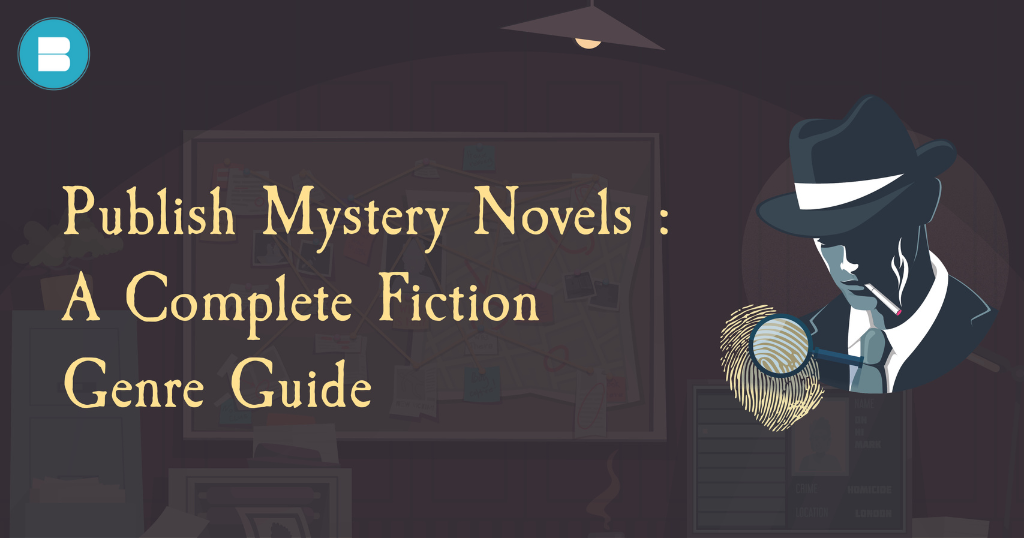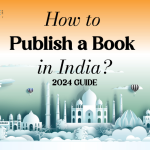Mystery books have a timeless fascination that draws readers of all ages in. Mystery fiction is a popular genre because of the thrill of solving a hard puzzle, the excitement of discovering hidden secrets, and the tension of a well-crafted storyline.
Looking to publish mystery novels? Learn how to publish a book in cost effective manner.
This article will walk you through the process of publishing mystery books if you’re an aspiring mystery writer or an author wishing to get into the field of detective fiction. We’ve got you covered on everything from comprehending the subtleties of the genre to advice for successful publication.
Exploring the Mystery Genre
Before delving into the intricacies of publishing, it’s crucial to understand the mystery genre’s various facets. Mystery novels encompass a wide range of subgenres, each with its unique elements. Here are some popular subgenres you might encounter:
- Detective Stories: Classic detective stories feature a brilliant sleuth who unravels a complex case. Think of Arthur Conan Doyle’s Sherlock Holmes or Agatha Christie’s Hercule Poirot.
- Mystery Crime Books: These novels focus on solving crimes, often involving murder, theft, or conspiracy. Authors like Raymond Chandler and Dashiell Hammett are celebrated for their contributions to this subgenre.
- Supernatural Fiction: Combining elements of mystery and the supernatural, these books introduce paranormal phenomena, ghosts, or otherworldly forces into the plot. Stephen King’s works often blend mystery with the supernatural.
- Fantasy Fiction Books: Fantasy mysteries transport readers to other realms, where magical and mythical elements are integral to solving the central mystery. Neil Gaiman’s “Neverwhere” is an example of this subgenre.
- Paranormal Books: Paranormal mysteries revolve around unexplained phenomena or supernatural abilities. Authors like Charlaine Harris have popularized paranormal mysteries.
Understanding Your Audience
Identifying your target audience is a crucial first step in publishing a mystery novel. Mystery readers are diverse, ranging from avid fans of cozy mysteries (typically featuring amateur detectives in quaint settings) to those who prefer gritty, hard-boiled crime novels. Consider the following when defining your readership:
- Genre Preferences: It’s critical to identify the mystery subgenre to which your novel belongs, such as cosy mysteries, police procedurals, or psychological thrillers. Different readers have different interests within the mystery genre, so identifying your subgenre allows you to properly focus your marketing efforts and connect with the correct audience.
- Demographics: Identifying your target readers’ demographics, such as age groups and gender, allows you to adapt your marketing techniques. Mysteries have the ability to capture a wide spectrum of readers, from young adults to elders, and knowing your target demographic helps you develop messaging and advertising strategies that will resonate with them.
- Tone and Style: The tone and style of your mystery novel play a pivotal role in attracting the right readers. Whether your book has a light, humorous tone or a darker, suspenseful atmosphere, it’s essential to convey this aspect clearly in your marketing materials. This ensures that readers who appreciate your chosen tone and style are drawn to your book.
Crafting a Compelling Mystery
A well-constructed mystery is the heart of any successful novel in this genre. Here are some key elements to keep in mind:
- Engaging Protagonist: Create a relatable and compelling protagonist—whether it’s a seasoned detective, an amateur sleuth, or a supernatural entity.
- Intriguing Plot: Craft a plot with unexpected twists and turns that keep readers guessing until the very end. Red herrings and misdirection can add depth to your story.
- Well-Defined Characters: Develop memorable supporting characters, each with their motives, secrets, and quirks. The interplay of personalities can enhance the mystery.
- Setting: Choose a setting that complements your story. Whether it’s a cozy village, a bustling city, or a mystical realm, the setting should contribute to the atmosphere and plot.
- Clues and Foreshadowing: Leave breadcrumbs for readers to follow, dropping subtle hints and clues that lead to the ultimate revelation.
The Writing Process
Once you have a firm grasp of your genre and audience, it’s time to write your mystery novel. Here are some writing tips to help you on your journey:
- Outline: Start with a detailed outline that includes key plot points, character backgrounds, and the central mystery’s resolution. This roadmap will keep your story on track.
- Pace Yourself: Balance suspenseful moments with quieter, character-driven scenes. Effective pacing is essential to maintain reader engagement.
- Edit and Revise: After completing your initial draft, edit rigorously. Check for inconsistencies, plot holes, and pacing issues. Beta readers can provide valuable feedback.
- Build Tension: Gradually increase tension as the story unfolds. Raise the stakes for your characters, making the mystery’s resolution all the more satisfying.
Navigating the Publishing Process
With your mystery novel in hand, it’s time to explore publishing options. Here are three primary routes:
- Traditional Publishing: Submit your manuscript to literary agents and publishing houses specializing in mystery fiction. This route offers access to professional editing, marketing, and distribution resources.
- Self-Publishing: Self-publishing platforms like Amazon Kindle Direct Publishing (KDP) and IngramSpark allow authors to publish their books independently. You have control over all aspects of your book, from cover design to pricing.
- Hybrid Publishing: Some authors opt for hybrid publishing, which combines elements of traditional and self-publishing. Hybrid publishers offer various packages, allowing authors to select the services they need.
Once you choose your publishing route, you’ll follow these steps:
- ISBN and Copyright
Secure an ISBN (International Standard Book Number) for your book, as it plays a crucial role in facilitating distribution and monitoring sales. Additionally, contemplate the option of copyright registration to enhance the protection of your work. These steps are pivotal in ensuring your mystery novel’s legal and logistical readiness for publication. - Book Cover Design
A mystery book’s cover design is critical for attracting readers’ interest and expressing the heart of the novel. It usually includes characteristics that allude to the mystery genre, such as dark and atmospheric images, fascinating symbols, or hints. To generate suspense, the colour palette frequently incorporates deep blues, blacks, or reds. Furthermore, the cover may feature crucial characters or locales, giving readers a look inside the story. A successful mystery book cover not only attracts readers in, but also promises a fascinating and enigmatic tale within its pages, piqueing their attention. - Typographical Setting
A mystery book’s formatting is critical to ensuring a good reading experience. Text, chapters, and layout must all be styled consistently. Font choices and size should be pleasing to the eyes, as should line spacing. Chapters should begin on a new page, with distinct titles and page numbers. White space should be provided by the margins. Maintaining a professional, clean structure in mystery books allows readers to focus on the tale without interruptions, increasing their absorption in the suspenseful narrative. To ensure readability and aesthetic appeal, proper formatting is required for both print and digital editions.
Marketing Your Mystery Novel
Regardless of your publishing path, effective marketing is essential to reach your target audience. Here are some marketing strategies for mystery authors:
- Author Website: An author website serves as your internet hub for readers to learn more about you and your literary works. It is a central platform for displaying your bibliography, sharing your writing path, and providing contact information. A well-designed website assists you in establishing professionalism and engaging with your target audience.
- Social Media Presence: Having a strong presence on social media sites such as Twitter, Facebook, and Instagram allows you to communicate with your fans and fellow authors directly. To cultivate a loyal following, share updates on your writing progress, communicate with your audience, and participate in literary conversations.
- Book Launch: A book launch is a critical milestone in your publishing career. It increases enthusiasm and interest in your latest release, whether performed in person or online. It’s a chance to interact with your audience, share insights into your work, and generate buzz that motivates them to read your book.
- Book Reviews: Encouraging readers to leave reviews on platforms like Amazon and Goodreads is vital for your book’s visibility. Positive reviews build credibility and attract new readers. Engage with your audience by asking for honest feedback and thanking them for their support.
- Author Branding: The process of creating a consistent and recognisable image that matches your writing style and the subjects of your mystery books is known as author branding. It includes features such as your author biography, book covers, and advertising materials. A strong author brand allows consumers to recognise and connect with your work across several titles.
- Crafting Your Instagram Persona
Publishing a mystery novel may be a gratifying experience that allows you to share your storytelling abilities with the rest of the world. You can bring your detective or supernatural story to life by analysing your audience, writing a captivating mystery, and navigating the publication process.
Remember that in the realm of mystery fiction, perseverance and passion are essential. So, take up your pen, begin writing, and go on an exciting adventure into the mysterious realm of mystery books.
Publish your book with BlueRoseONE and become a bestselling author. Don’t let your dream of becoming an author fade away, grab the opportunity now and publish your book – be it fiction, non fiction, poetry or more.
Good luck with your writing!
















